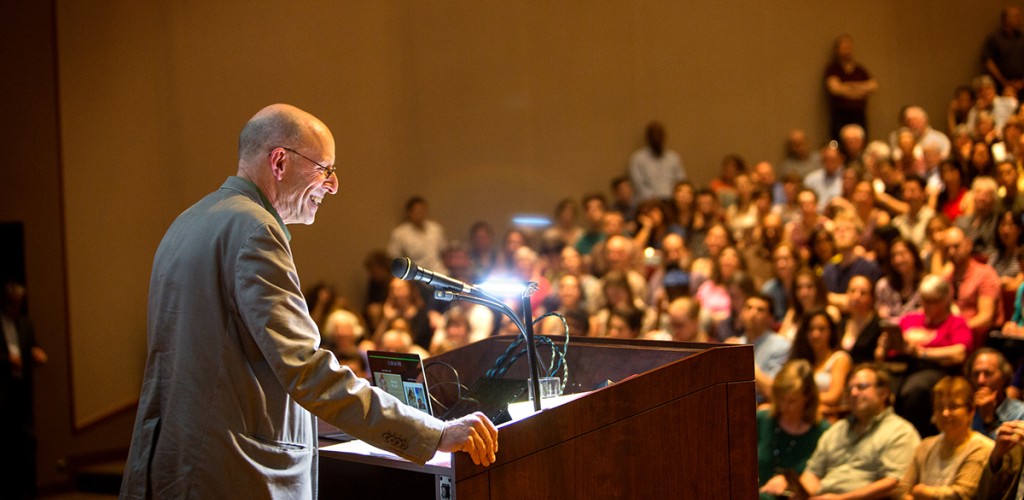At the time Michael Pollan first wrote about his adventures in gardening, he never intended to make food and the natural world his primary topics as a writer. Now, having written numerous articles and several best-selling books, including “The Omnivore’s Dilemma” and “The Botany of Desire,” he is a celebrated expert.
“How did I get to food? It wasn’t inevitable, part of my life plan,” he said in front of an overflow crowd April 27 in Kennedy Hall. Pollan detailed how his career as a nature writer evolved in his talk, “Out of the Garden,” the 19th annual Jill and Ken Iscol Distinguished Environmental Lecture.
“This is one of the places where the future of food is being written,” he said, referring to the university, in his introduction.
“My whole project as a writer begins in the garden,” he said, and “when I discovered that some of the books that I treasured most in college were failing me miserably” when he began growing food.
“Thoreau was and is a hero, but he was not a very good or determined gardener, and his mentor, Emerson, wasn’t much better,” he said, referencing “that whole problematic strain of American nature writing that holds up the wilderness as the ultimate and ideal form of nature.”
Henry David Thoreau had failed with a large planting of beans he tried to cultivate, he said. “That moment when he gives up the garden represents a turning point in American culture … in favor of the wilderness,” Pollan said.
“I planted my garden with these ideas in view. I had no fence. I was going to be harmonious, and I wasn’t prepared for this,” he said, a giant close-up of a woodchuck filling the screen above him. Detailing his “titanic struggle with this beast” in an early essay he read from, about what he called “my horticultural Vietnam,” the scenes of resulting destruction would lead to his first book in 1991, “Second Nature: A Gardener’s Education.”
“I didn’t realize then that this was my topic, that I was essentially a certain kind of nature writer,” he said. “I thought I was just a writer, I’d done this thing on gardens, and then I was going to move on and do something else, and then something else.”
His next project, “A Place of My Own,” was ostensibly to be about architecture, and designing and building a writer’s cabin for himself in Connecticut. But during the writing, Pollan continued to be drawn to questions about nature.
For anyone starting their second book, he said, “you find out who you are as a writer, through the process of discovering which of the questions that obsessed you in writing your first book are dropped, and which turn out to be the ones you simply can’t let go of.”
He returned to plants and human history in “The Botany of Desire” (2001), his first best-seller, a study of nature and culture through historical case studies of apples, tulips, marijuana, and potatoes, which spawned a PBS miniseries. His most recent book, “Cooked,” considers cooking’s role in human evolution and man as “the animal that cooks.”
“My first two books were, foremost, narratives of learning or detective stories, which are almost the same thing,” he said. “I almost always approach a subject not as an expert but as a naïf, as someone who is just starting and has some obvious questions he is trying to answer.”
His new project is “an exploration of the history and science of psychedelic consciousness,” he said, sharing some of his research into what the Aztecs called “the food of the gods.” The heyday of psychedelics research in the 1950s led to suppression of that research in the 1960s, “and now it’s coming back,” he said, including clinical trials “giving psilocybin to terminal cancer patients for existential distress.”
The Iscol lecture is sponsored by Cornell’s Atkinson Center for a Sustainable Future.





